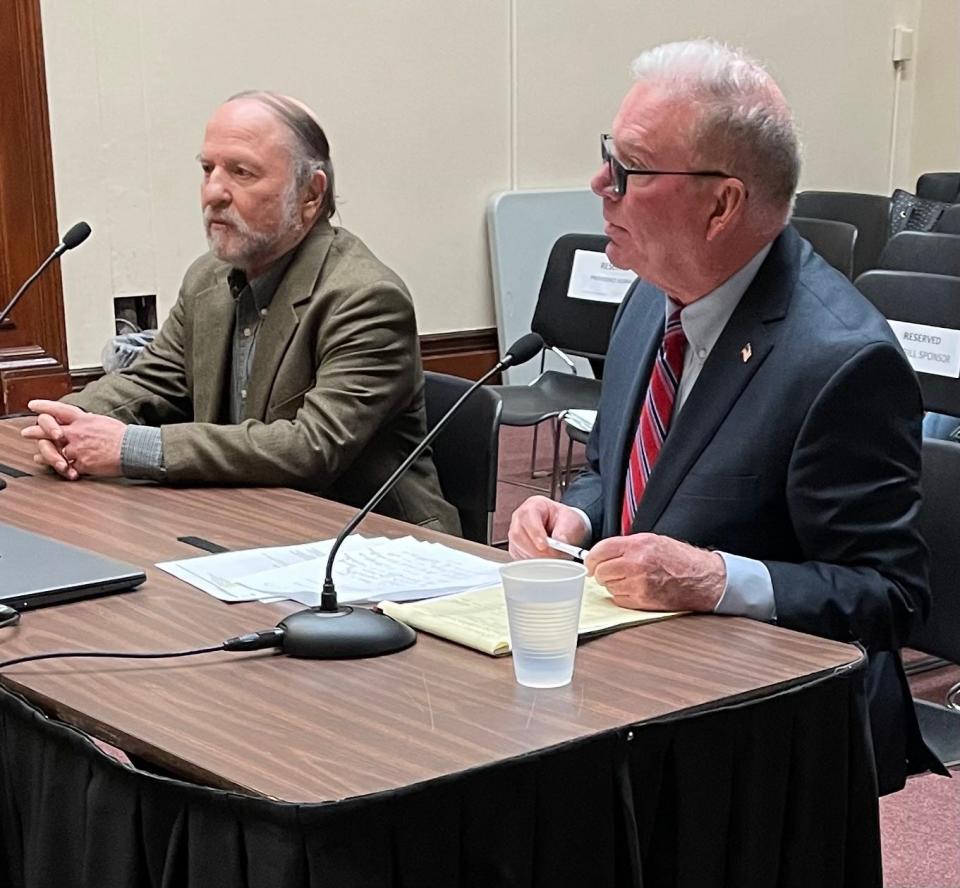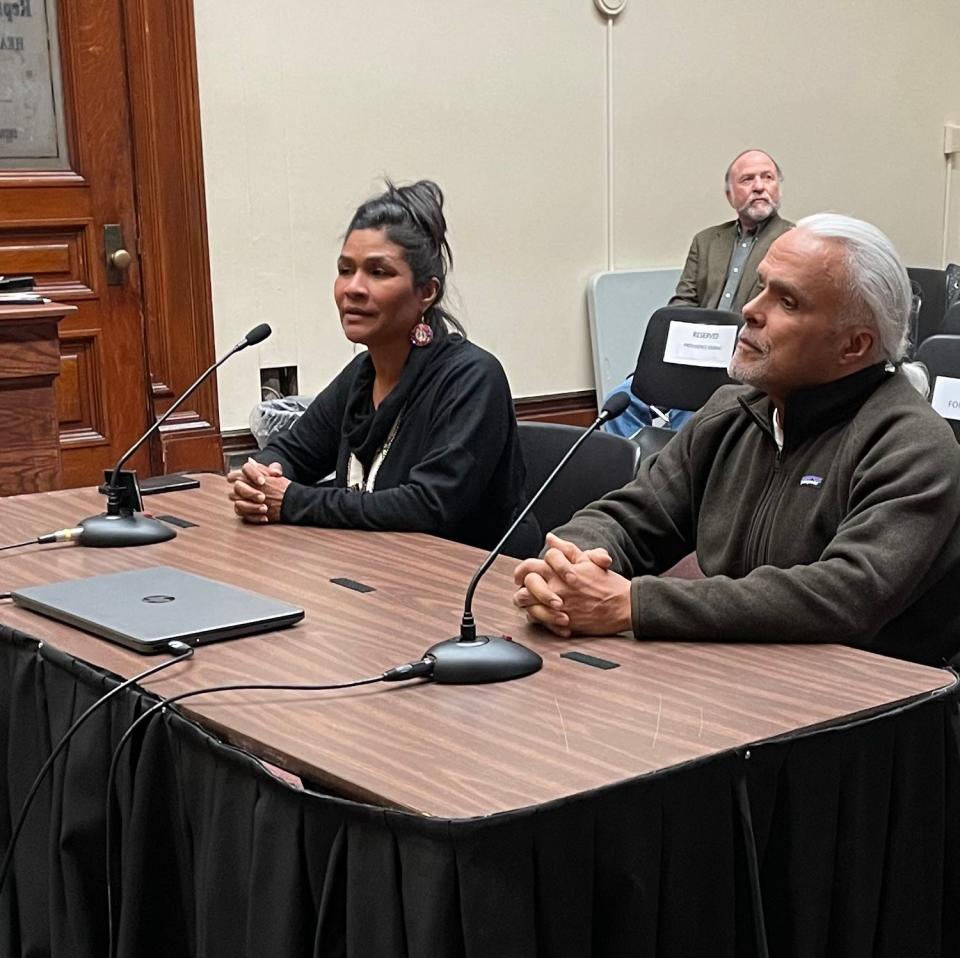Their frozen embryos were not safe at a RI hospital, and they didn't know until they asked
CRANSTON − In the years when her best and last hope of having her own children centered on 18 frozen test-tube embryos stored at Women & Infants Hospital, Elaine Meyer "would drive out of her way to pass by the hospital, stopping in the parking lot to sing lullabies to them while in her car."
One resulted in the birth of a son, Noah, now 26 years old.
What happened to two other embryos led to a pending lawsuit against Women & Infants, a major exposé in the New York Times titled "The Lost Embryos" − and now a newly introduced bill to regulate the handling and storage of embryos that was up for a hearing at the Rhode Island State House on Tuesday night.
"I entrusted my embryos to the hospital where I went to for treatment. ... Then the worst nightmare happened. They were lost and we were not told about them," Meyer, now 65, told The Journal on Monday. "That's devastating for a family.
"We could have had a second child. We could have had a third child. There were two embryos left ... and what pains me to this day, and will always pain me, is the fact that I was not able to fulfill my duty to my embryos, to give them a chance at life."
Meyer's ordeal leads to the Embryo Safety and Storage Act of 2023
"No one [else] should go through the heartache of finding out that ... they have an embryo that's been misplaced for 20 years," said Rep. Joseph McNamara, the Warwick Democrat who introduced the “Embryo Safety and Storage Act of 2023" after hearing what happened to Meyer and her husband, Barry Prizant.

Women & Infants has not responded to a Journal request for comment.
Meyer is a longtime psychologist at Boston Children’s Hospital and associate professor of psychology at Harvard Medical School who also teaches bioethics. Prizant is a speech and language pathologist and an adjunct professor in the Department of Communicative Disorders, College of Health Sciences, University of Rhode Island.
In 2017, they got a bill out of the blue for $500 for the storage of two misplaced embryos that, according to the New York Times, were located in 2010 — in damaged vials — "when the tank was emptied for cleaning or maintenance."
It turns out, they are not the only Rhode Islanders to whom this happened.
At a State House hearing on Tuesday night on McNamara's bill, Randy and Bella Noka told their own painful story of what happened to their embryos that remained in cryostorage at Women & Infants after the birth of their son, Randy Jr.
They said several years of drama in the lives of Rhode Island's Narragansett Indians − including the 2003 raid by state troopers of a tribal smoke shop − made them put family plans temporarily on hold.

Year after year, Bella Noka said, she got letters from the hospital's fertility clinic affirming that her embryos were there, waiting. But when the time came to inquire about them, she told a House committee, she was at first informed there were none, and then when she pressed, that they had not survived thawing.
She said she contacted several lawyers who each told her she'd have no case because embryos "are not considered life," and the hospital's lawyers "would drown us in paperwork."
That was nearly 20 years ago. The Nokas fear the embryos were sold. And now, "there is the unknown factor. What became of them?" Randy Noka told lawmakers.
In 2019, The Journal told the story of Marisa Cloutier-Bristol, who also learned for the first time in summer 2017 that Women & Infants Hospital in Providence had kept a cryopreserved embryo of hers in storage since 2004, the year she underwent in-vitro fertilization treatment with her husband, John Cloutier, who died in 2006.
More:Woman sues clinic over 13-year delay in disclosing frozen embryo
"Since finding out about the embryo — through a mailing sent out by Women & Infants announcing an update to its storage policy — Cloutier-Bristol has been haunted by thoughts of what could have been," the story said.
In January 2019, she too filed a lawsuit against the hospital, contending that its negligence robbed her of the chance to have another child, causing her severe emotional distress.
McNamara said he is aware of at least one other case, involving a third couple planning to come to Tuesday's hearing by the House Committee on Health & Human Services to tell their story and urge legislative action to make sure nothing comparable ever happens to another family.
What are the rules on storing embryos in Rhode Island?
There are currently three sites in Rhode Island where eggs, pre-embryos and embryos are stored: Women & Infants Fertility Center, Fertility Solutions, and Boston IVF, according to the Rhode Island Department of Health.
But "there are no regulations in Rhode Island right now specific to embryo storage or handling,'' according to health department spokesman Joseph Wendelken. "We are reviewing this bill now. We do not have a position at this time," he said Monday.
"It is in the best interest of the people of this state to direct the Department of Health to promulgate rules and regulations governing the storage of human eggs, pre-embryos and embryos in embryo storage facilities to guard against catastrophic storage system failure and the potential loss of such specimens that may result from long-term power outages during storms and other natural disasters."
Meyer said the legislation is modeled after New Jersey law.
"People depend on those," she said. "People who have infertility, LGBTQ people ... people who have had cancer... those of us who need help [to] build our families really, really depend that our eggs and embryos are going to be kept safe, and when we need them they are going to be healthy and they are going to be able to find them.
"In our case, they lost two of them."
At a minimum, she said there should be licensing and oversight to make sure, for example, "that the liquid nitrogen levels are at the proper level," that there is training for staff in case there are any problems, and "proper auditing to make sure the specimens are labeled properly so they can be tracked and monitored ... and there's no discrepancies in the inventory."
.
This article originally appeared on The Providence Journal: Embryo Safety and Storage Act would regulate how frozen embryos in RI are stored

